2011 CHANS fellows to turn AAAS annual meeting into human-nature idea exchange
Feb. 1, 2011
Eleven up-and-coming scientists studying the relationships between human and natural systems will mine the American Association for the Advancement of Science annual meeting this month for ideas, partnerships and inspiration as part of the CHANS Fellows program.
"Some junior scholars who are interested in research on the interconnectedness between human and natural systems may not be able to attend conferences and other professional events without financial assistance," said Jianguo "Jack" Liu, principal investigator of CHANS-Net. “The Fellows Program was set up to help these promising scientists connect with other researchers at a prominent national event."
"Providing these networking opportunities will help the fellows become the next generation of leaders in human and natural systems research, education and application," said William McConnell, co-principal investigator.
The 2011 CHANS fellows are:
- William Burnside
- Neil Carter
- Irem Daloglu
- Anne Hayden
- Adam Henry
- Michael Kiparsky
- Tien Ming Lee
- Jeffrey Luzar
- Lisa Mandle
- Kristine Metzger
- Leila Sievanen
William Burnsi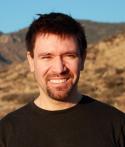 de, biology doctoral student, University of New Mexico. Burnside studies how temperature, food availability and other environmental variables affect how human and animal societies acquire, process and distribute food and information and how that "societal metabolism" affects ecological patterns.
de, biology doctoral student, University of New Mexico. Burnside studies how temperature, food availability and other environmental variables affect how human and animal societies acquire, process and distribute food and information and how that "societal metabolism" affects ecological patterns.
"At the organism level, I assess how temperature affects the rates predators catch and eat prey, parasites attack and infect hosts, and competitors push one another out of their territories," Burnside said. "At the society level, I work with computer scientists to study how the size of ant societies affects the rate they cooperatively metabolize information to detect and harvest food. I also study how energy availability affects patterns in traditional and modern human societies, from the territory sizes of hunting and gathering cultures, who use plant and animal energy directly, to the economic growth rates of modern nations, who use mostly fossil fuel energy. I hope to combine these threads of research to better understand how metabolism affects patterns of similarity and diversity in human societies and other animal societies."
Burnside's interest in ecological diversity was fueled by the years he spent collecting insects as a child in the desert near his El Paso home. After earning his undergraduate and master's degrees at Stanford and the University of Michigan, respectively, he was drawn to the work of Jim Brown at the University of New Mexico, whose work includes the study of broad forces behind patterns of biological diversity.
The opportunity to collaboratively explore the frontiers of sustainability science at a national forum piqued his interest in the Fellows Program.
"The chance to learn firsthand about work across a broad spectrum of sustainability studies intrigued me a great deal, as did the opportunity to forge bonds with members of the broader network of scientists," Burnside said. "I also want to be part of a meeting that actively tries to infuse the wonder and transformational impact of science into public life."
View Burnside's poster presentation Toward a Macroecology of Sustainability.
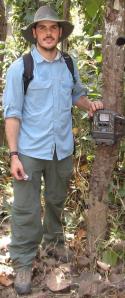 Neil Carter, conservation biology doctoral student, Michigan State University. A member of the MSU Center for Systems Integration and Sustainability, Carter studies how people and tigers interact along the border of the Chitwan National Park in Nepal.
Neil Carter, conservation biology doctoral student, Michigan State University. A member of the MSU Center for Systems Integration and Sustainability, Carter studies how people and tigers interact along the border of the Chitwan National Park in Nepal.
"I'm evaluating how people affect tiger habitat in space and through time," Carter said. "I'm also looking at tiger activity -- where they are, their movement, and any conflict with people -- along the border of the park and how tigers modify their behavior based on where people are and what they're doing, whether it's tourist sightseeing groups or local people gathering fodder and firewood."
Carter also is evaluating local attitudes and tolerance towards tigers, which is the first time this had been done systematically. His goal is to incorporate all the relationships into a model that can be used to forecast tiger-human interactions and then create conservation policies that promote long-term coexistence between humans and tigers.
Carter's dream of studying tigers took shape when he was about 7 and watching a nature show on television that showed a declawed panther being attacked and killed by a pack of dogs.
"I just had a weird emotional reaction to the show that stayed with me," he said. "Then I learned about tigers' conservation status, that they were dying because of people, and I became infatuated with them."
He wanted to be a fellow so he could meet potential collaborators and learn about new research on human and natural systems.
"Being a fellow will give me the opportunity to start down that path."
 Irem Daloglu, resource ecology and management doctoral student, University of Michigan. A former engineer and financial analyst in Turkey who earned a Fulbright Scholarship to study engineering management at Northeastern University, Daloglu now examines the relationships between human and natural systems in agriculture.
Irem Daloglu, resource ecology and management doctoral student, University of Michigan. A former engineer and financial analyst in Turkey who earned a Fulbright Scholarship to study engineering management at Northeastern University, Daloglu now examines the relationships between human and natural systems in agriculture.
"I'm studying how a farmer's decision to adopt conservation practices influences downstream water quality," she explained.
Conservation practices are generally considered ways to improve water quality and improve agricultural sustainability. Daloglu's research strives to reveal exactly how much each adopted conservation tactic improves the quality of water downstream from the farm, with the goal of increasing sustainability.
"This research project is using two modeling approaches: a social model and a physically-based watershed model," she said.
The chance to work with and exchange ideas with other human and natural systems researchers are what attracted her to the Fellows Program.
"I'm hoping to establish a professional network of colleagues with similar research interests, ranging from junior researchers to well-established academics and to get familiar with the projects carried out by other CHANS fellows," Daloglu said.
 Anne Hayden, interdisciplinary marine sciences doctoral student, University of Maine. Hayden works to understand the mechanisms causing the severe decline of North Atlantic cod populations.
Anne Hayden, interdisciplinary marine sciences doctoral student, University of Maine. Hayden works to understand the mechanisms causing the severe decline of North Atlantic cod populations.
"In particular, I'm interested in the mismatch in scale between fishing activity and fisheries management programs, and the ecological scale of the cod population. Understanding this issue may provide clues to successfully restoring this highly prized and ecologically significant species," Hayden said.
After earning her master's degree in forestry and environmental studies, Hayden served as director of marine programs for the Maine Audubon Society and then as a policy develop specialist for the Maine State Planning Office. In 1994, she founded Resource Services, an independent consulting company that specializes in analyzing natural resource and environmental issues.
Hayden is looking forward to meeting other human and natural systems scientists at the AAAS meeting.
"The interdisciplinary nature of the CHANS project is exciting to me because it allows us to connect social and ecological processes in a way that explains fisheries outcomes more realistically than traditional fisheries models," she explained. "My goal in becoming a CHANS fellow was to share what I have learned about working across social and natural science boundaries and to learn from others who are doing the same."
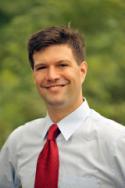 Adam Henry, assistant professor of public administration, West Virginia University. Henry's research interests focus on the relationships between policy networks, institutions and sustainability.
Adam Henry, assistant professor of public administration, West Virginia University. Henry's research interests focus on the relationships between policy networks, institutions and sustainability.
"A major challenge of sustainability is to figure out how to design political processes to encourage cooperation between groups that traditionally do not speak with each other or that have a history of conflict," he said. "This is important for avoiding the fragmented decision making that characterizes many traditional policy systems."
This research requires a better understanding of how people form opinions on environmental issues, as well as how they use and interpret scientific information and how social networks affect learning, conflict and cooperation.
"I'm also very interested in the methodological challenges that go along with this type of research. I use multiple approaches to test theories on networks and institutions, including agent-based modeling, statistical models of network structure, and mathematical models of self-organizing networks," Henry added.
He sees the Fellows Program as an important part of building a community of scholars focused on approaches to promoting sustainable development across disciplines.
"As a member of the sustainability science community, I believe that research on sustainability should be oriented towards understanding the complex dynamics that operate across social and ecological systems," Henry said. "Being a CHANS fellow means having the opportunity to share ideas with other scientists working in very different theoretical traditions from my own, but who share an underlying interest in the relationships between human behavior and environmental change."
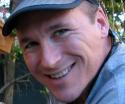 Michael Kiparsky, research assistant professor of geography, University of Idaho. Kiparsky studies how water resource managers adapt to climate change and other changes to social and hydrologic systems, focusing on how risk influences decisions by the managers.
Michael Kiparsky, research assistant professor of geography, University of Idaho. Kiparsky studies how water resource managers adapt to climate change and other changes to social and hydrologic systems, focusing on how risk influences decisions by the managers.
"I'm using the ideas of loss aversion and risk aversion to understand how managers deal with risk in their water supplies," Kiparsky said. "I also want to look at how these measures can clarify decision making in the face of uncertainty."
He also uses integrated models of water operations and hydrology to assess the impacts of climate change and population growth on the reliability of water supplies.
"This framework allows me to quantify risks, impacts and trade-offs that will result from climate change and a growing population," he continued. "I work on these questions because in the face of climate and water system changes, adaptive responses will be necessarily. Asking how humans should, and will, react will become increasingly important for understanding systems and planning for future changes."
The idea of connected human and natural systems has driven Kiparsky's research since he began study water resources from both technical and social science perspectives.
"I wanted to be a CHANS fellow for the opportunity to interact with others with similar interests and, more broadly, to gain exposure to how others define the concept," he said. "The idea of coupled human and natural systems neatly contains all of the interdisciplinary work I'm interested in, so the opportunity to learn about other approaches that have been taken and to continue to define areas in which I can contribute is attractive to me."
Tien Ming Lee, biology doctoral student, University of California, San Diego. Lee's research focuses on the reasons people encroach on protected tropical forests.
"Tropical reserves are critical for biodiversity conservation, but widespread forest loss may undermine conservation effectiveness," Lee said.
To identify what is causing forest loss in and around 6,500 reserves in 82 developing countries, Lee is combining cross-scale socioeconomic information with high quality satellite image data. His goal is to give forest managers and government officials new tools to create sustainable policies.
"I hope that my findings will advance our understanding of the local, regional and global drivers of forest loss at tropical reserves with the goal of developing more viable tropical forest policies," he said.
Lee views the AAAS meeting as the perfect platform to connect with leading experts studying the relationships between human and natural systems.
"The CHANS project represents a unique and impressive network of colleagues working on a wide range of interests associated with coupled human and natural systems across the globe," Lee said. "Overall, I believe that my experience with CHANS-net will be extremely beneficial and crucial to meet my goal of developing more effective biodiversity conservation efforts."
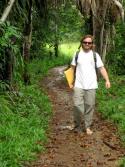 Jeffrey Luzar, post-doctoral researcher, affiliated with the State University of New York and Stanford University. Luzar is an anthropologist studying the relationships between indigenous culture, hunting and wildlife dynamics in the Guyanese Amazon. His goal is to understand the implications of integrating the two societies: indigenous and national.
Jeffrey Luzar, post-doctoral researcher, affiliated with the State University of New York and Stanford University. Luzar is an anthropologist studying the relationships between indigenous culture, hunting and wildlife dynamics in the Guyanese Amazon. His goal is to understand the implications of integrating the two societies: indigenous and national.
"I'm particularly interested in the influence of culture -- including indigenous cosmologies and various forms of Christianity -- on hunting in vast areas of Amazonia managed by indigenous people," Luzar said.
He also has worked to develop research methods that include local people in the data collection process. The goal is to understand key processes in tropical systems and improve local communities' ability to manage the natural resources on which they depend.
Luzar sees strong similarities between human and natural systems research being done in the CHANS project and his research.
"I was attracted to the CHANS project because of the significant parallels between it and the approach our research team has been using to understand human-environment dynamics in the Guyanese Amazon," he said. "As a CHANS fellow, I look forward to the opportunity to both share some of the findings from our project and to meet with and learn from researchers working in other coupled human and natural systems."
Lisa Mandle, botany doctoral student, University of Hawaii at Manoa. She is interested in how people's management of land affects the benefits people get from natural systems, as well as the conservation of biodiversity within those systems.
"Much of the world’s remaining terrestrial biodiversity is in human-modified tropical ecosystems outside of protected areas," she said. "I study the impacts of leaf harvest, grazing and fire on a wild palm species and on surrounding plant diversity in the Western Ghats region of India."
Mandle wants to determine the mechanisms that cause trade-offs between conserving biodiversity and acquiring direct benefits from it. She also wants to know the consequences of these trade-offs.
"Understanding these trade-offs is key to effectively managing ecosystems for both the people whose well-being depends on them and for the diversity contained within them," she said.
Mandle believes meeting with other human and natural systems researchers at AAAS will enrich her research.
"I'm looking forward to interacting with other researchers who study coupled human and natural systems, to sharing and receiving feedback on my own research, and to gaining exposure to new methods of enquiry and analysis in CHANS-related fields," she said.
 Kristine Metzger, research associate, University of British Columbia; Centre for Biodiversity Research, Serengeti Biodiversity Programme. Metzger is studying the complex relationships between human livelihood strategies and biodiversity conservation in the greater Serengeti ecosystem in Tanzania.
Kristine Metzger, research associate, University of British Columbia; Centre for Biodiversity Research, Serengeti Biodiversity Programme. Metzger is studying the complex relationships between human livelihood strategies and biodiversity conservation in the greater Serengeti ecosystem in Tanzania.
"Despite the wealth of information available in the Serengeti system, there's a disconnect between scientists focused on the ecological dynamics within the protected area -- Serengeti National Park -- and scientists from other disciplines, such as sociology, anthropology, economics and epidemiology, focused on dynamics outside the park," Metzger said. "But the conservation of biodiversity and natural resources are intimately tied to the needs of humans and development, and vice versa."
Metzger is exploring land cover change by integrating vegetation change driver and human health and demographic data.
Like the other 2011 fellows, she is looking forward to collaborating with other scientists.
"With this CHANS program and fellowship opportunity, I hope to exchange ideas and methods with other researchers who are successfully integrating human needs and development goals with conservation agendas," she said.
 Leila Sievanen, post-doctoral research associate, Center for Environmental Studies, Brown University. An environmental anthropologist, Sievanen is interested in the social, cultural and political aspects of marine conservation and resource management.
Leila Sievanen, post-doctoral research associate, Center for Environmental Studies, Brown University. An environmental anthropologist, Sievanen is interested in the social, cultural and political aspects of marine conservation and resource management.
She's leading a multidisciplinary team studying marine management in six sites in Fiji, Palau, Mexico and California, specifically looking at a concept called ecosystem-based management, which is popular in policy and management circles in Western countries.
"I want to understand how this concept works or doesn't work in specific contexts," she said. "I got interested in this project after my experiences in the Peace Corps in Nicaragua and graduate school left me wondering why Western conservation models often don't succeed in non-Western contexts. My dissertation research focused on factors affecting local support for a marine protected area in Indonesia and led me to wonder about the factors that determine how marine conservation models are adopted in both Western and non-Western sites."
Sievanen's current work is part of a larger project based at Brown and Duke universities.
"I was attracted to the CHANS fellow program because it offered the chance to be exposed to cutting-edge research on human-nature interactions, join a network of interdisciplinary researchers and discuss new ideas that may lead to future projects or collaborations."







